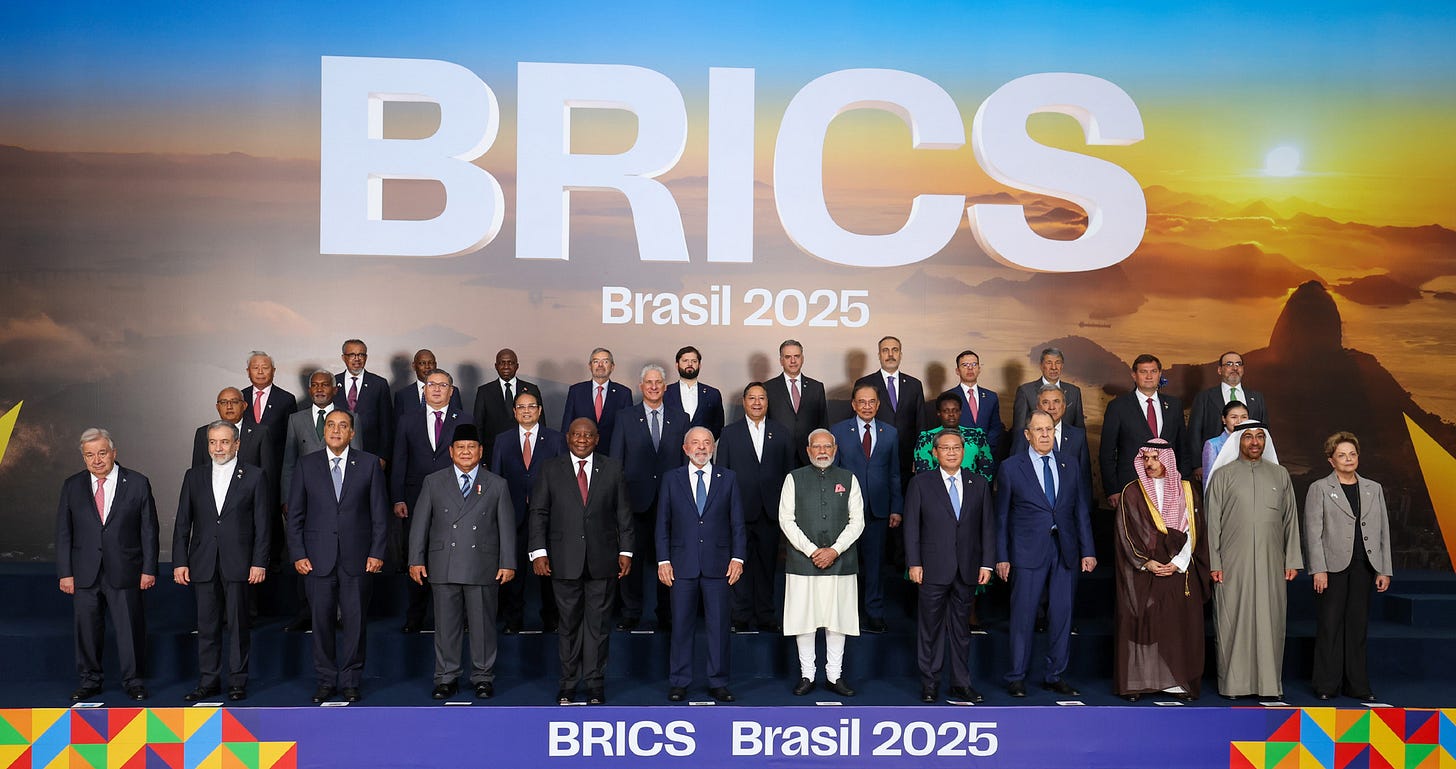In 17th BRICS Summit
Members Reiterate Commitments to Multilateralism and International Law

Heads of state from the BRICS countries gathered in Rio de Janeiro, Brazil, from 6-7 July for their 17th summit. At the summit, BRICS countries denounced the attempts by the United States to undermine global trade by waging a tariff war. They called for strengthening multilateral forums and international laws to create a more equitable global order, in a joint declaration adopted during the summit.
The joint declaration titled “Strengthening Global South Cooperation for Inclusive and Sustainable Governance” was adopted on Sunday 6 July, calling for increased cooperation among BRICS members in areas such as politics and security, economy and finance, and culture and people to people contacts.
Brazilian President Luiz Inácio Lula da Silva led the proceedings of the two day summit, which began on Sunday. The summit was attended by Chinese Premier Li Qiang, Indian Prime Minister Narendra Modi, South African President Cyril Ramaphosa, and several heads of other member states and their representatives. Russian President Vladimir Putin addressed the summit through a video conference.
This is the first summit attended by Indonesia, which became the 11th full member of BRICS in January this year.
During his inaugural speech, Lula called BRICS a successor of the Non-Aligned Movement (NAM). He claimed that since there are growing attacks on multilateralism and international laws and the world is witnessing “unprecedented” conflict since World War II, it is necessary for “BRICS to contribute” to bring peace and development in the world through strengthening multilateral forums.
Lula reiterated BRICS’ resolve to work for comprehensive reforms in the existing multilateral forums such as the UN, including its Security Council, the International Monetary Fund (IMF), the World Bank, and others to “increase their legitimacy, representativeness, effectiveness and democratic character.”
Several other leaders, including Chinese premier Li Qiang talked about BRICS playing a more concrete role in international politics at a time when “unilateralism and protectionism” are on the rise and the principles of UN and other multilateral forums such as WTO are under attack.
The joint declaration mentions 126 commitments made by the leaders of BRICS, including their resolve to enhance mutual trade, cooperation in science and technology, climate cooperation and so on.
Multipolarity and representation
In the joint declaration, BRICS nations agreed to enhance their strategic partnership for “promoting peace, a fairer and more representative international order, a revitalized and reformed multilateral system, sustainable development and inclusive growth.”
BRICS believes that “multipolarity can create opportunities for developing countries and emerging markets” and reiterated the need for comprehensive reforms in the UN, including in the Security Council as stated by its Johannesburg summit declaration in 2023.
Affirming that the Global South is “a driver of positive change” in the world, the BRICS countries voiced “serious concerns about the rise of unilateral tariff and non-tariff measures which distort trade and are inconsistent with WTO rules.”
They reiterated their collective opposition to “unilateral coercive measures” or sanctions, calling them contrary to international law. These unilateral measures violate the basic human rights of the people in the targeted countries and deny them the opportunity to develop and particularly affect the most vulnerable and poor sections of the population, BRICS members noted.
The joint declaration announced that BRICS members “do not impose or support non-UN Security Council authorized sanctions.”
BRICS also agreed to work on an increased quota at the IMF and the World Bank for emerging and developing countries. Demanding that these quotas should reflect the “relative positions of countries in the global economy” and must not favor the developed west as it does now.
The Rio declaration also called for cooperation in “global AI governance” claiming any such move “must mitigate potential risks and meet the needs of all countries, including those in the Global South.”
Making it one of the top priorities of the Brazilian presidency, the BRICS declaration called for global health governance by enhancing international cooperation and solidarity for the elimination of socially-determined diseases. It identifies hunger and poverty as the root of these diseases and vows for enhanced cooperation for their elimination.
Global conflicts and wars
BRICS nations unanimously condemned the Israeli and US military strikes inside Iran last month, calling them “a violation of international law and charter of the United Nations.”
They pointed out that the attacks on Iran’s nuclear facilities were in violation of the relevant resolutions of the International Atomic Energy Agency (IAEA) and demanded that “nuclear safeguards, safety, and security must always be upheld, including in armed conflicts, to protect people and the environment from harm.”
Speaking during the summit, Iran’s Foreign Minister, Abbas Araghchi, demanded that the attacks which targeted his country’s civilian infrastructure, innocent citizens, and protected nuclear facilities must be condemned by the global community as their effects are not limited to Iran and will be felt by “the whole region and beyond.”
BRICS nations also condemned Israel’s continued war and aggression against Palestinians in Gaza. “We condemn all violations of international humanitarian law (IHL), including the use of starvation as a method of warfare,” the joint declaration said, also condemning Israel’s attempts to “politicize or militarize humanitarian assistance”.
The BRICS joint declaration also demanded that Israel must stop its repeated violations of the ceasefire agreements with Lebanon and withdraw all its “occupying forces from all of the Lebanese territories”.
It also expressed support for peace efforts in Syria, Sudan, and other parts of the world, emphasizing the need for local and domestic initiatives.
President Lula, during his inaugural speech, mentioned how NATO’s recent decision to increase the defense expenditure to 5% of their GDP demonstrates the misplaced priorities of the global north. He noted that they have money for war but no money for climate action or helping poorer countries achieve their sustainable development goals.
“It is easier [for NATO members] to designate 5% of the GDP to military spending than to allocate the 0.7% that has been promised for Official Development Assistance [for poorer countries].”





1. "successor of the Non-Aligned Movement (NAM)" - yes that worked well. Beg off two opposing powers and fight amongst yourselves for the spoils, differing over ideals from the start. Same here. BRICS = authoritarian patriarchal non-growth hell. God help the non binaries...
2. "It also expressed support for peace efforts in Syria, Sudan, and other parts of the world, emphasizing the need for local and domestic initiatives" - sure, expressions. So expressive these third rate male run tinpot states....when WILL those local initiatives start?? When will the begging and whining end? When will those MEN do something other than suck on the teat of their impoverished state coffers. Democracy = innovation.
Go West. Copy the West. Criticize the West.
Pretend BRICS is a force for the Global South. Just so hypocritical.